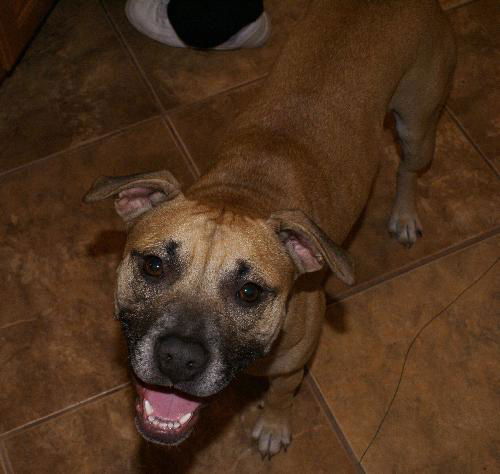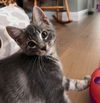Welcome to Pet Rescue By Judy!
401 South Laurel Avenue
Sanford, FL 32771
(407) 302-4497
info@petrescuebyjudy.com
Ginger the Boxer Mix's Web Page

| My Rescue |
| Login to Remember your Favorite Animals and Breeds! |
Name: Ginger the Boxer Mix
Status: Adopted!
Adoption Fee: 275.00
Species: Dog
Breed: Boxer (short coat)
Learn more about the Boxer.Color: Tan
Sex: Female (spayed)
Current Size: 40 Pounds
Potential Size: 50 Pounds
General Potential Size: Medium
Current Age: 15 Years 8 Months (best estimate)
Activity Level: Moderately Active
Indoor or Outdoor: Indoor Only
Good with Dogs: Yes
Good with Kids: Yes
Microchipped: Yes
Ginger the Boxer Mix's companion, Lila the Silver Beauty (adopted) can also be seen on our website.
Description:
Foster Update 1/7 - Ginger is such a lover. She would sit all day and let you pet her. When she first came to me she wouldn't even hardly let you let you pet her, she was so afraid of everything. Ginger was recently adopted but returned due to not getting along with their other dog. I am fostering her and she lives with 5 other dogs that she plays well with, but she does still have a few trust issues. She does get along with other dogs, but I think an ideal home for her would be where she is the only dog so that way she doesn't have to share the attention.
Ginger loves the outdoors. She is easy to handle on the leash and loves to go for walks. She is a bit timid riding in the car. I crate her at night and she loves her crate, I think it is a security for her. Ginger has so much love to give, so if you are looking for a sweet loving girl, she is the one.
This little stray found a wonderful foster home to help her. She is a good dog with a great personality and is looking for a forever home. Ginger gets along with most dogs, but must be in a home with strong leadership to help her build confidence.
Foster Update: Ginger practically came up to my front door. She had never been inside of a house before because she was scared to death once inside. She cowered when she heard sounds, and she wouldn't walk on my tile floors, she stayed on the carpet. She would never roll on her back for you to pet her belly, she would just stiffen up and cower on the floor. But oh what a few weeks will do. Ginger is now the happiest dog around. She loves to snuggle, play, and have her belly rubbed. She doesn't cower anymore. Ginger gets along great with other dogs, and children. Though she chases my cats so I wouldn't recommend cats. She is a very smart girl and a very fast learner. She is already crate trained! Ginger still has a cute little puppy bark and her tail spins around in a complete circle.
Foster Update: Ginger is just a happy playful pup. She is estimated at 1 yr old but she is still very much a puppy. She loves to play with my other dogs. She has alot of energy! Ginger gets along well with my 5 other dogs but she will show dominance to other dogs when it comes to her food and her bed. Ginger does well with my children but could use some additional training. She does not do well with cats. She chases them! Ginger is still in the chewing phase so she needs lots of chew toys. Ginger walks great on a leash and she is potty trained. A yard would be good for her as she loves to run and play. She listens well and is a very SWEET girl.
According to www.dogbreedinfo.com, the Boxer's ancestors were two German mastiff type dogs, the Bullenbeiszer and the Barenbeiszer. They were later crossed with the powerful ancestors of the Mastiff and Bulldog. Early on, these dogs were prized for hunting, bull baiting, and for pulling carts. A bit farther down the family tree, Boxer ancestors became cattle dogs, and were used to round up livestock. They were also popular circus and theater dogs because they learned tricks so easily. Breeding was rather indiscriminate until the first Boxer studbook was started in 1904, stabilizing the breed standard. In spite of its German origins, "Boxer" is an English name that suitably describes the dog's punchy fighting style. Though early Boxers may have been quite ferocious, the breed today is a very gentle, loving family companion. Some of the Boxer's talents are watchdogging, guarding, police work, military work, search & rescue, competitive obedience, schutzhund and performing tricks. The Boxer is happy, high-spirited, playful, curious and energetic. Highly intelligent, eager and quick to learn, but can be stubborn and sneaky. The Boxer is a good dog for competitive obedience. Constantly on the move, bonding very closely with the family. Loyal and affectionate, Boxers are known for the way they get along so well with children. A well brought-up and properly socialized Boxer will also get along with his own kind and other household pets. However one Boxer owner reported; their Boxer is best friends with their many barn cats and second dog, but will chase and eat their ducks and other farm birds. The female boxer will often get into fights with other female dogs, trying to display her dominance. If one owns a female boxer and another female dog, they will get along and even play most of the time, however they will most likely fight from time to time. It has been said that the name Boxer came from the way the Boxer likes to use is front paws for just about everything. If you have ever watched a Boxer go about his business you may have noticed the way he paws at his toys, food bowl and you for that matter, in a very playful cat-like way. Some Boxers have been known to paw at their food or water bowl if they are empty. Playfully barking, pawing and playing with the bowl, flipping it upside-down and putting their front paws on the top of the bowl, sliding it around the house barking and whining until someone fills it for them. It looks like a silly game, but the Boxer knows what he is trying to tell you, he's hungry! While participating the sport of schutzhund, Boxers are known to jump up and use their front paws as if they are boxing. They are very clownish and playful and have been known to grab and carry ANYTHING around including your knickknacks if he thinks he can get away with it. The Boxer's nature is to protect you, your family, and your home. Known visitors will be welcomed boisterously. They are always keen to work and play. Boxers need lots of human companionship. They can be rather boisterous and even in old age are still extremely athletic. Teach the Boxer not to be boisterous and especially not to jump up at people. Boxers LOVE to jump. This breed is noted for courage and makes great guard dogs. Boxers have a wide use in military and police work. Training should start young and be firm and consistent. This breed requires a dominant owner. An excellent watchdog, the Boxer will restrain an intruder in the same way a Bulldog does. They have a life expectancy of 11-14 years.
Videos of Ginger the Boxer Mix:


Other Pictures of Ginger the Boxer Mix (click to see larger version):
 36k |
 64.3k |
 31k |
 27.4k |
 30.7k |
 25.8k |
 32.8k |
Copyright © Pet Rescue by Judy





